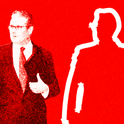In politics you can recover from anything, the former Tory chancellor Norman Lamont used to say. For a very select group of top political escapologists, this is true.
Among the greats of the last century, Churchill, FDR and Mitterrand come to mind. All three started in politics in their 20s and made it their lifelong profession to achieve and retain power at the highest level, like Johnson. And all three did so, recovering in incredible ways from setbacks which at the time appeared terminal. In FDR’s case, the onset of polio appeared literally terminal, and certainly a bar to presidential ambitions. But he mastered it, and only in the very last months of his life did he allow himself to be photographed or filmed in a wheelchair. He died in office, having just been elected to an unprecedented fourth term.
Churchill recovered from the Dardanelles catastrophe, one of the most serious failures of the First World War, for which he was largely responsible. He then survived the collapse of his Liberal Party in the 1920s, jumping ship to the Tories just in time. Then he survived a disastrous chancellorship—his return to the Gold Standard in 1925 caused mass unemployment—and most famously, a decade later, led an almost single-handed opposition to appeasement within Neville Chamberlain’s Conservative Party, which only months before the outbreak of war in 1939 almost forced him out of the House of Commons. Then in 1945, after the post-war Labour landslide reduced his Tory Party to rubble, he manoeuvred successfully to remain leader of the Opposition and six years later, to near universal astonishment, at the age of 76, returned to No 10 for another four years.
Mitterrand’s career is maybe the most extraordinary of the three. Successfully covering up his early years as a senior official for the wartime Vichy government, he became a top minister in French right-wing parties in the 1950s before being forced out by General de Gaulle in his virtual coup of 1958. More than 20 years later, after a series of failed attempted returns and even a faked assassination attempt against himself, Mitterrand won the presidency as leader of a new socialist party created in coalition with the communists. He then served 14 years as president, longer even than de Gaulle, securing re-election in alliance with the centre after ditching the communists—all despite suffering from advanced cancer, which he instructed his doctors to cover up as a “state secret.” All the while, he in effect had two wives and families, the first of which didn’t even know about the second until his funeral.
Boris Johnson is still in Houdini’s nursery by comparison with these three. But he has some of their more extraordinary characteristics—especially Mitterrand’s—and they are on full display in the latest catastrophe of a (so far) 20-year political career which has lurched from crisis to crisis, all of which he has so far survived, including the opening stages of “partygate” and this week’s interim Sue Gray report.
First, he has a greater will to power than almost anyone else at the top of British politics. As I describe in my Prospect profile “The Prime Etonian,” his ambition and sense of entitlement are stratospheric and have been since his hugely privileged school and university days at Eton and Oxford. I’m not sure that even Churchill, the grandson of a duke and son of a Tory chancellor, had more ambition and sense of political entitlement than Johnson, the great-grandson of the last sultan of Turkey’s interior minister and son of a Tory MEP who wanted similar glory for his most flamboyant offspring.
Secondly, like Mitterrand, he has virtually no shame and virtually no political principles. He manipulates even the greatest of state policies, like Brexit, simply to achieve mastery at any given moment. And he constantly operates at or beyond the limit of the law and conventional norms. His capacity to dodge, switch and manoeuvre are greater than that of anyone else around him for as long as he can maintain power, alliances and momentum to stop his enemies closing in.
Third, in his early career he became a celebrity—as did all three of the great survivors I describe above—which puts him on a plane above almost all of those with whom he contends in the political arena, giving him a direct line to the media and the public which he mobilises at key moments of unpopularity.
I am not foolhardy enough to predict Johnson’s fate in the clearly perilous oncoming stages of partygate. Criminal charges are possible. Even Houdini came to a grisly end. But if he survives, it will be because he is Britain’s greatest modern proponent of political escapology.













